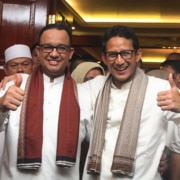Indonesia at Melbourne will again be taking a short break over the Christmas and New Year period. In our last two posts of the year, we look back at the most popular articles and podcasts featured in 2019, plus a few more of our favourites. Thanks for your continued readership and support and we will see you again when we return in mid-January.
Do Indonesians still care about human rights?
In the most popular blog post of 2019, Dr Robertus Robet and Dr Alfindra Primaldhi presented survey results suggesting that most Indonesians have a basic understanding of human rights and believe they are important. But when survey respondents were pressed further on individual rights, a much less rosy picture emerged.
Jakarta bruised but Prabowo’s wrecking likely to fail
The protests against the official announcement of President Joko “Jokowi” Widodo’s re-election in late May marked the culmination of a months-long campaign by losing candidate Prabowo Subianto to discredit the election. Dr Dave McRae reflected on the violent protests and looked at what could be done to prevent a repeat of the turmoil in future elections.
The end of the KPK – at the hands of the ‘good’ president
Jokowi came to power on the back of promises to strengthen the Corruption Eradication Commission (KPK). But as Rafiqa Qurrata A’yun and Abdil Mughis Mudhoffir wrote in one of the most popular posts of the year, in the end he played a major role in contributing to its demise.
An Indonesian perspective on ‘Egg Boy’: was he really defending Islam?
In March, Will Connolly, a 17-year-old who egged racist Australian Senator Fraser Anning, was celebrated in Indonesia for defending Islam – one of the few occasions when Australian politics received widespread coverage in Indonesia. Iqbal Aji Daryono reflected on his time living in Australia, and said Indonesians who concluded that Connolly was acting to defend Islam were only seeing part of the picture.
Democracy in retreat as push for fifth amendment gains momentum
In late August, Giri Ahmad Taufik wrote about the now increasingly real possibility that the national legislature will amend the Constitution for a fifth time to reinstate the Soeharto-era State Policy Guidelines (GBHN), and effectively render direct presidential elections irrelevant. If they succeed, Giri wrote, there will no longer be any doubt about democratic regression in Indonesia.
Child marriage: Constitutional Court finally ditches religious arguments
Late in 2018, the Constitutional Court made a historic ruling, finding that the current marriageable age of 16 for girls was unconstitutional, eventually leading to the national legislature revising the 1974 Marriage Law to make the marriageable age 19 for both men and women. Dr Dina Afrianty examined the landmark decision – a remarkably different outcome to the last time the Court heard the issue in 2015.
Prabowo’s challenge: in search of a legal and evidentiary miracle
Prabowo Subianto filed a challenge to his election loss with the Constitutional Court in late May. Professor Simon Butt examined the key arguments made in the challenge, predicting that the court would again rule in Jokowi’s favour, as it did in Prabowo’s last challenge in 2014.
To achieve real representation, women need more power in political parties
In the 2019 legislative elections, 40 per cent of candidates were women. This record proportion of female candidates saw women’s representation in the national legislature increase only marginally to about 20 per cent. Before the election, Julia Ikasarana and Mia Novitasari took a comprehensive look at women’s representation in Indonesian politics, suggesting that if more women held strategic positions in political party structures, then the number of women placed in winning positions on the ballot paper would likely be higher.
Death by overwork: the complicated case of the Indonesian election
Revelations that hundreds of election workers had died administering Indonesia’s massive single-day elections in April were reported sensationally in Indonesia and around the world. But were these deaths really so questionable? Dr Jesse H. Grayman took a closer look at the issue.
Can Jokowi clean up Indonesia’s legal mess?
Before the election, Jokowi proposed establishing a new body to address Indonesia’s problem of excessive, overlapping and contradictory regulations, a proposal that now looks like it will become reality, in the form of the National Regulation Agency. Rizky Agama examined the priorities for this new agency if it is to resolve Indonesia’s “regulation crisis”.
Indonesians better get ready for jail, as flawed new criminal code looks set to pass
A few weeks before widespread student protests helped to ensure its (temporary) demise, Anugerah Rizki Akbari examined the most controversial elements of the proposed revised criminal code, which would have seriously threatened human rights and led to over-criminalisation.
Jokowi set to win: Melbourne experts respond
The day after Indonesia’s presidential and legislative elections, University of Melbourne academics Professor Vedi Hadiz, Professor Tim Lindsey, Dr Dave McRae, Dr Ken Setiawan, Dr Rachael Diprose, Dr Ariane Utomo and Dr Richard Chauvel offered their early thoughts on Jokowi’s victory.
‘If we are monkeys, don’t force monkeys to fly the Indonesian flag’: racism, nationalism and Papua
In August, racist conflicts involving ethnic Papuan students in Surabaya and Malang sparked pro-independence demonstrations throughout Papua. Dr Richard Chauvel wrote that exposure of the racism that Papuans face on a daily basis seemed to prompt a shift in the discourse about the acceptance of Papuans in Indonesia.
After Jakarta: imagining a new capital
Days after his election victory, Jokowi made the somewhat surprising announcement that Indonesia would establish a new capital city outside Java. Dr Amanda Achmadi wrote that moving the capital will have little impact on Jakarta’s many challenges. But the proposal is an opportunity, she said, to reflect on what constitutes Indonesia beyond Java, and how regional Indonesians see their future as part of the nation.

























